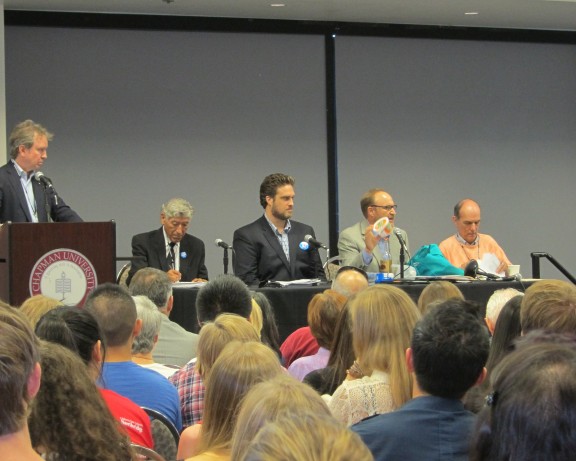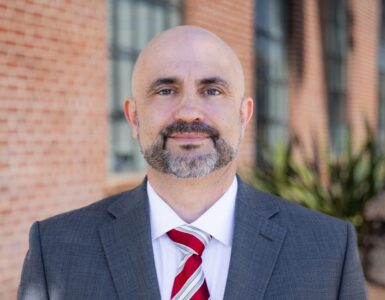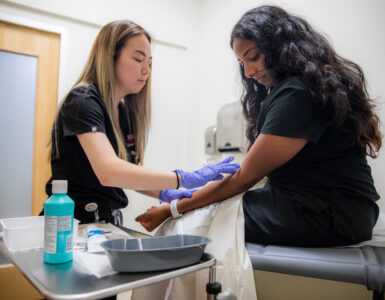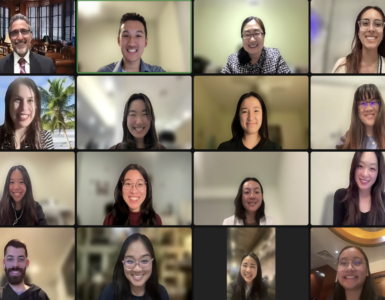
Holding up a food container to make a point about the proposed law is Brendan Huffman, a spokesperson for the No on Prop. 37 campaign. Also pictured, from left, is moderator and UC Riverside food scientist Alan McHughen, food activist John Diaz, Dave Murphy, founder, Food Democracy Now , and George Salmas, attorney and principal for The Food Lawyers.
The debate over Proposition 37, the California ballot measure that would require labeling of genetically engineered food, heated up in a lively campus debate last week, with both sides drawing cheers and occasional hoots from the audience.
Nearly 200 people attended the panel discussion, sponsored by the Food Science Club and featuring two speakers each from both sides of the
Prop. 37 divide
. Although the measure addresses package labeling, much of the discussion Friday focused on the safety of genetically modified foods, especially corn, soybeans and sugar beets, whose myriad byproducts are staples of the packaged food industry.
“Emerging scientific studies have shown possible and potential harm from these ingredients,” said Dave Murphy, founder of Food Democracy Now.
Regardless of what people think of the science, consumers have the right to know if their food was grown from modified seeds, said food activist John Diaz. Such labeling is required in much of Europe and not onerous, he said.
“We have a basic democratic right to know what’s in our food,” Diaz said.
But critics of the proposition countered that there is no peer-reviewed scientific evidence that modified foods pose any harm.
“There’s no credible science that says GMOs are a problem,” said George Salmas, an attorney and the managing principal for The Food Lawyers.
Farmers’ markets, small specialty and ethnic food stories would be especially burdened by the labeling requirements, said Brendan Huffman, past CEO of the Valley Industry & Commerce Association as well as a former director of public policy with Los Angeles Area Chamber of Commerce.
The measure’s regulations would trigger countless lawsuits and pass on the expense to consumers, “the last person in the food chain, excuse the pun,” Huffman said.
The afternoon debate also ended up offering a glimpse into the passions sparked by the proposed food labeling law. Just prior to the panel discussion, Prop. 37 advocates led a peaceful march from The Plaza Park in Old Towne Orange up to the campus. At times during the panel discussion, various members of the standing-room-only audience in the George H.W. Bush Conference Center burst into applause or mutterings of disagreement as the speakers spoke.
But it was the undecided voters and food science students that the event’s organizers had in mind, said Clarissa Salazar (M.S.), vice president of the Food Science Club, who along with Greg Yudin (M.S./MBA), club president, planned the Prop. 37 event.
“Hopefully those that were on the fence have a clearer idea on what they might vote for when Nov. 6 comes around. What we are most proud of was the turn out, especially from the students. We really did this for them. We had students from CSU Northridge, Cal Poly Pomona, Santa Ana, Santiago, OCC, and of course our Chapman students. We wanted to make an event that can inform them on what is happening in the food industry.”
Chapman Newsroom
Main Menu >
Media Contacts
Office of Public Relations
PR@chapman.edu
Strategic Marketing and Communications
1 University Drive
Orange, CA 92866
Contact Us
Strategic Marketing and Communications
1 University Drive
Orange, CA 92866
Contact Us
Newsroom Site
Your Header Sidebar area is currently empty. Hurry up and add some widgets.




Add comment